|
|
|
Sort Order |
|
|
|
Items / Page
|
|
|
|
|
|
|
| Srl | Item |
| 1 |
ID:
099206
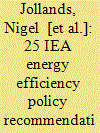

|
|
|
|
|
| Publication |
2010.
|
| Summary/Abstract |
The imperative to pursue energy efficiency improvements is clearly on the political agenda at all levels of governments. This paper explores the lessons from past attempts at galvanising international efforts to expand energy efficiency activities through the use of international-level recommendations. Drawing on these lessons, the paper outlines the IEA response to the call for policy advice on energy efficiency through the G8 Gleneagles Plan of Action. Specifically, the paper outlines a 'necessary conditions' framework that was used to develop a set of energy efficiency policy priorities and describes the subsequent recommendations presented to the G8 in Hokkaido-Toyako Summit in 2008. The recommendations cover 25 fields of action in seven priority areas: buildings, appliances, lighting, transport, industry, energy utilities and cross-sectoral issues. Together, the suite of recommendations sets out an ambitious road map for global energy efficiency improvement. If implemented globally without delay, they could save around 8.2 GtCO2/yr or 96 EJ/yr by 2030. This is equivalent to roughly twice the current total EU energy-related CO2 emissions.
|
|
|
|
|
|
|
|
|
|
|
|
|
|
|
|
| 2 |
ID:
127167
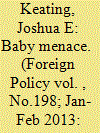

|
|
|
| 3 |
ID:
161019


|
|
|
|
|
| Summary/Abstract |
ega-scenarios for world development in the 21st century are not terribly diverse. The first among them, held to be the mainstream in present-day political thought, is reduced to forecasting American domination for the foreseeable future. U.S. preponderance over all other powers, certainly as concerns the main components of might, is unprecedented.
|
|
|
|
|
|
|
|
|
|
|
|
|
|
|
|
| 4 |
ID:
124092


|
|
|
|
|
| Publication |
2013.
|
| Summary/Abstract |
In November 2010, the G20 Summit was held in Seoul. The G20 has increasingly replaced the G8 as being the premier forum for international economic cooperation, but in November 2010, it was the first time that a summit was held in country that was not a G8 member. It was by the Korean government seen as evidence of the country finally having achieved the goal of becoming an advanced nation playing, while still constrained by the division of the peninsula, a global role in line with its economic standing. The article argues that this has been a constant theme in Korea's foreign policy since it was originally formulated in 1994 as part of the country's globalization policy. This addition of an intentional dimension, to the objective capabilities created during the previous decades, has increasingly resulted in the type of behavior associated with middle power status.
|
|
|
|
|
|
|
|
|
|
|
|
|
|
|
|
| 5 |
ID:
127430
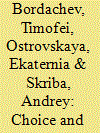

|
|
|
|
|
| Publication |
2013.
|
| Summary/Abstract |
None of the integration projects in history has ever encountered so strong resistance from both East and West. Its intensity denies the publicly declared thesis that the project is artificial, immaterial and even doomed.
|
|
|
|
|
|
|
|
|
|
|
|
|
|
|
|
| 6 |
ID:
142563


|
|
|
|
|
| Summary/Abstract |
This article provides a case study in the new and developing field of inter-organisational relations by looking at the position of the European Union (EU) within the Group of Eight (G8). It analyses the questions of why inter-organisational relations start, and how they develop over time. I argue that inter-organisational relations are determined by the dynamics within the international organisations that are involved: both the characteristics that define these organisations, as well as the preferences of their constituent parts. The G8-EU relation was a by-product of European integration resulting from the transfer of competences, but was initially thwarted by the strong and divided preferences within the EU. While the G8’s informality at first facilitated this internal division, it also enabled this relation to change over the following decades. This change cannot only be ascribed to rationalist and social-institutionalist factors but also testifies to a logic of path dependence.
|
|
|
|
|
|
|
|
|
|
|
|
|
|
|
|
| 7 |
ID:
146692


|
|
|
| 8 |
ID:
096958
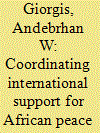

|
|
|
|
|
| Publication |
2010.
|
| Summary/Abstract |
The many regional and intrastate wars and conflicts have contributed significantly to Africa's overall economic, political and strategic marginalisation in world affairs. The AU's new African Peace and Security Architecture (APSA) is designed to provide conflict prevention, peace-keeping and peace-building on the continent, but lacks autonomy. The UN, EU, G8 countries, China and, to some extent, NATO and India are active players on the African peace and security scene and are engaged in assisting APSA's operationalisation. But the multiplicity of actors, the magnitude of resources involved and the enormity of the challenges point to the need to enhance coordination by setting up a single entry point for channeling international assistance. Having provided the most funding to date, and with its strong strategic ties with Africa and its extensive participation in other regional and global fora, the EU is best equipped to coordinate support to minimise wasteful duplication, ensure synergy in developing the APSA and implementing its mandate.
|
|
|
|
|
|
|
|
|
|
|
|
|
|
|
|
| 9 |
ID:
117380


|
|
|
|
|
| Publication |
2012.
|
| Summary/Abstract |
OUR COUNTRY'S PROMINENT ROLE in dealing with many global issues and regional conflicts, a permanent seat on the UN Security Council, participation in the G8 and G20 - this is a far from complete list of criteria that reflect the geopolitical status of Russia. The completion of a multi-year negotiation process on the terms of Russian participation in the World Trade Organization (WTO) lends credence to our consistent policy to integrate the country into the global economy and strengthens the international position of Russia as one of the key participants in the process of reforming the global economic architecture.
|
|
|
|
|
|
|
|
|
|
|
|
|
|
|
|
| 10 |
ID:
075422
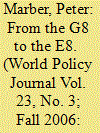

|
|
|
| 11 |
ID:
109174


|
|
|
|
|
| Publication |
2011.
|
| Summary/Abstract |
This article analyses the degree of European Union (EU) actorness within the Group of Eight (G8). Drawing on the work of Jupille and Caporaso, actorness is probed along the criteria of recognition, authority, cohesion and autonomy. We argue that the vague, flexible and informal nature of the G8 has contributed to rather nuanced and ambiguous degrees of actorness. When assessing the above criteria, overall the EU's actorness remains questionable. As for recognition, while the EU is treated as an equal by other G8 delegations, actual membership remains disputed, and third parties such as the media remain reluctant to accept EU representation as equal. Authority in terms of legal competence tends to be of lesser importance in the G8, given the informal nature of this institution. Informally, the Commission has managed to enhance its authority when it can provide substantial expertise. Cohesion has proven perhaps the most limited aspect of EU actorness. Although value cohesion is substantial, there are no formal mechanisms that tie the European participants together. Commission autonomy in the G8 is considerable in terms of its own separate institutional apparatus, as well as formal performance and compliance scores that differ from those of the European G8 members. However, ultimately the Commission's freedom of action usually remains subject to the control of its principals. Yet, EU actorness tends to differ per context as our tentative analysis of the factors conducive to autonomy indicates.
|
|
|
|
|
|
|
|
|
|
|
|
|
|
|
|
| 12 |
ID:
117798


|
|
|
|
|
| Publication |
2012.
|
| Summary/Abstract |
When future historians consider the global governance role of the G8, they would do well to consider its approach to Africa. For the first decade of the new millennium, G8 summits sustained an extraordinary focus on the continent. Responding to African governments' proposed New Partnership for Africa's Development (NEPAD), G8 governments produced a succession of agreements and initiatives, anchored by the 2002 Africa Action Plan and the 2005 Gleneagles declaration on Africa and development. These initiatives were framed by a motif of "partnership." They provided elite impetus toward a more comprehensive "Third Way" bargain for Africa. Collectively, they illustrate some stark limits to designs for a transnationally hegemonic approach to global challenges. In consequence, they have contributed to the erosion of G8 purpose and legitimacy.
|
|
|
|
|
|
|
|
|
|
|
|
|
|
|
|
| 13 |
ID:
068702
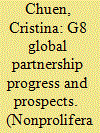

|
|
|
| 14 |
ID:
081745
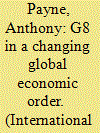

|
|
|
| 15 |
ID:
050715


|
|
|
|
|
| Publication |
Aldershot, Ashgate Publishing Limited, 2004.
|
| Description |
xxv, 334p.
|
| Series |
G8 and global governance series
|
| Standard Number |
0754608794
|
|
|
|
|
|
|
|
|
|
|
|
Copies: C:1/I:0,R:0,Q:0
Circulation
| Accession# | Call# | Current Location | Status | Policy | Location |
| 047681 | 327.17/KIR 047681 | Main | On Shelf | General | |
|
|
|
|
| 16 |
ID:
146693


|
|
|
|
|
| Summary/Abstract |
Pivotal informal organizations, above all the G20, the G7 and the BRICS, have accumulated growing power in recent years. At a basic level, informal organizations differ from the formal institutions such as the UN and the IMF in a number of key ways: membership structure; foundational or legitimizational character and level of bureaucracy. What are the implications of this phenomenon for global governance? What does this shift from a hub club to a focal point network imply for innovation in modes of cooperation? The author has participated in numerous such summits, in his capacity as Prime Minister of Italy and President of the European Commission, and shares his first-hand thoughts.
|
|
|
|
|
|
|
|
|
|
|
|
|
|
|
|
| 17 |
ID:
119037
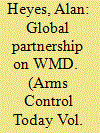

|
|
|
| 18 |
ID:
154713


|
|
|
|
|
| Summary/Abstract |
Building on recent discussions of the role of public-private partnerships in governance, this article argues that we must be more critical of the goals set by PPPs, and pay closer attention to the ways in which gender-based inequalities are obscured or overlooked in the construction of global policy strategies. In particular, the Group of 8's New Alliance for Food Security and Nutrition pledges to “act upon the critical role” played by women. Yet this article reveals that the New Alliance partnerships offer little in terms of substantive goals that address the gender inequalities experienced in rural land and labor markets, and instead appear to favor the expansion of trade without reference to the implications for rural food security.
|
|
|
|
|
|
|
|
|
|
|
|
|
|
|
|
| 19 |
ID:
100695
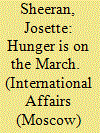

|
|
|
|
|
| Publication |
2010.
|
| Summary/Abstract |
Golden Collection series. The UN World Food Program provides food aid to the world's hungry, thus saving about 100 million people from starvation. Russia contributes to the program by sending the hungry hundreds of tons of grain totaling tens of millions of dollars through the UN World Food Program. Last year Russia chaired the UN WFP Executive Council. Immense efforts have been exerted by the Russian Federation and through our representative to accomplish those tasks that the world community has assigned to the WFP.
|
|
|
|
|
|
|
|
|
|
|
|
|
|
|
|
| 20 |
ID:
091527


|
|
|
|
|
| Publication |
2009.
|
| Summary/Abstract |
In response to threats posed to the future supply of energy and to the environment, the G8 leaders, in Gleneagles, UK in 2005, agreed to an initiative called the Gleneagles Plan of Action (GPOA) which addresses climate change, clean energy and sustainable development. In the GPOA, G8 leaders pledged to encourage the development of cleaner, more efficient and lower-emitting vehicles, and to promote their deployment by, among other means, asking the IEA to review existing standards and codes for vehicle efficiency and to identify best practices.
In order to properly response to the above-mentioned requests from G8 leaders, the IEA has launched, among other activities, study on policies for "transforming the way we use energy" focusing on end-use efficiency including the one in transport sector and made a comprehensive response to the GPOA at the 2008 G8 Summit Meeting in Japan with 25 recommendations on energy efficiency. Regarding these recommendations, the G8 leaders have proclaimed, in the G8 Hokkaido Toyako Summit Leaders Declaration, that they would maximize implementation of the IEA's 25 recommendations.
|
|
|
|
|
|
|
|
|
|
|
|
|
|
|
|
|
|
|
|
|